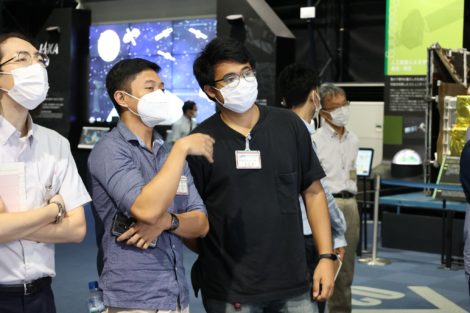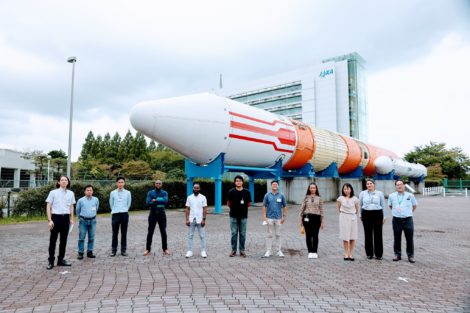Two Filipino students are first recipients of Japan’s Space Tech scholarship

University of the Philippines students John Paul Almonte (second from left) and Charleston Dale Ambatali (third from left) during a retreat at the Japan Aerospace Exploration Agency where they presented their respective Graduate Studies research. | Photo credit: JICA Philippines
MANILA, Philippines — University of the Philippines students John Paul Almonte and Charleston Dale Ambatali are the first beneficiaries of scholarships from the Japan International Cooperation Agency-Japan Aerospace Exploration Agency (JICA-JAXA) Network for Utilization of Space Technology (JJ-NeST).
JICA Philippines announced this on December 7, noting that the selection came out following the immersion of scholars in the work of JAXA through the JJ-NeST program.
Almonte’s study revolves around developing a tracking system for ground sensor terminals used in satellite store-and-forward networks for remote data collection. These networks are used in environmental monitoring, emergency communications, and telemedicine.
Ambatali’s work, on the other hand, is about space-based solar power stations that collect power from the sun and send it toward the Earth for a stable renewable energy source.
“This system is still in its early stages of research but will promote the use of renewable energy in the future,” said Ambatali.

University of the Philippines students John Paul Almonte (fifth from right) and Charleston Dale Ambatali (sixth from right) along with scholars from Vietnam, Indonesia, Thailand, and Rwanda, pose for a photo in front of Japan Aerospace Exploration Agency. | Photo credit: JICA Philippines
According to JICA Philippines, Almonte is taking up his Master’s in Electrical and Space Systems Engineering at Kyushu Institute of Technology until 2023 while Ambatali is taking up his doctorate in the Department of Aeronautics and Astronautics at The University of Tokyo Graduate School of Engineering until 2024.
The JJ-NeST program aims to graduate 20 students from countries like the Philippines, Vietnam, Indonesia, Thailand, and Rwanda in the next five years.
“We’ve designed our human resource development in the Philippines, especially in space technology, to address long-term sustainability and impact. Hopefully, more young Filipinos will be encouraged to study space technology and work with Japan,” said JICA Philippines Chief Representative Sakamoto Takema.
RELATED STORIES
PH eyes launch of biggest, costliest satellite in 2025
PH cube satellites complete orbit around Earth